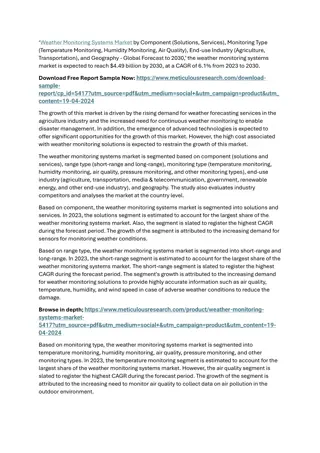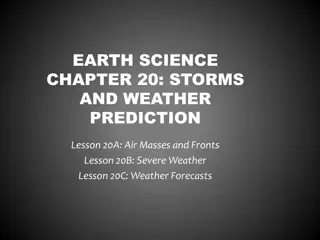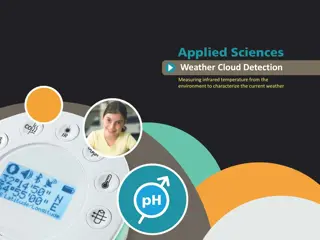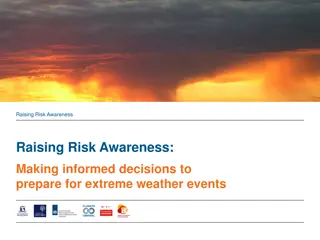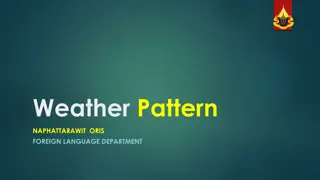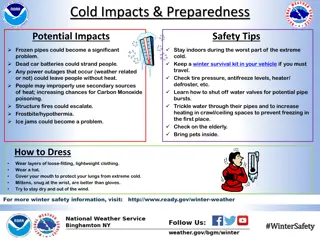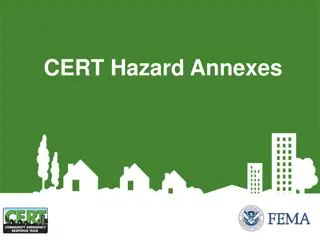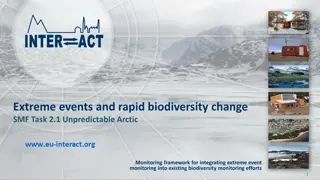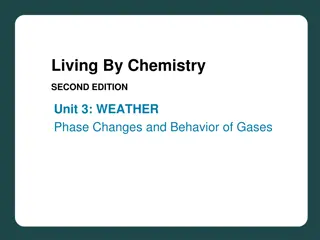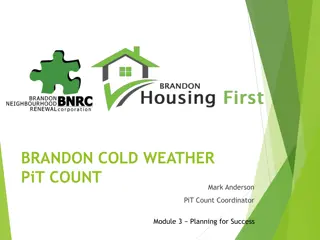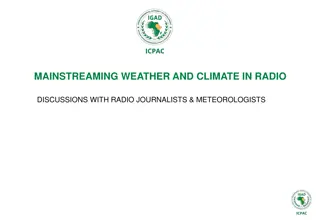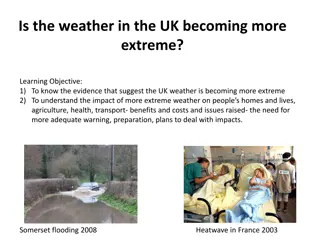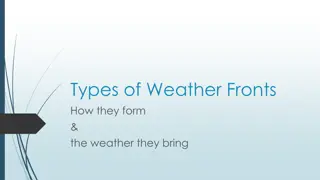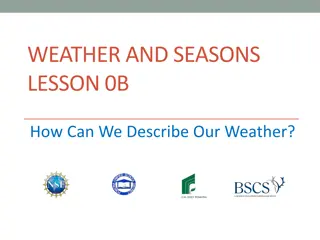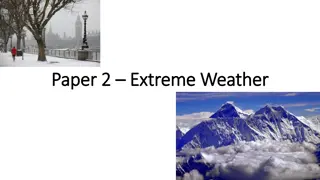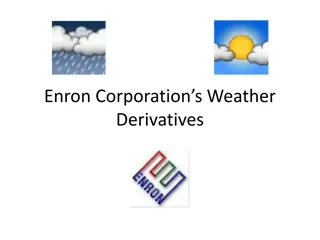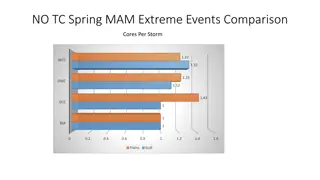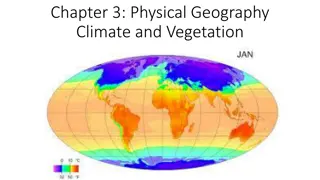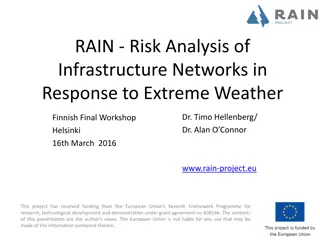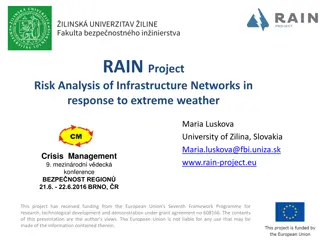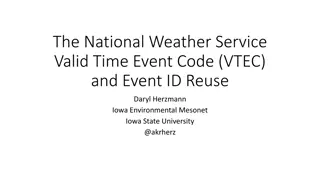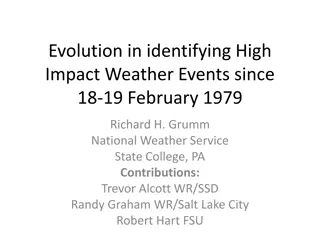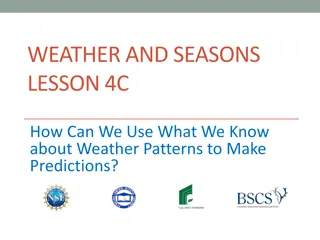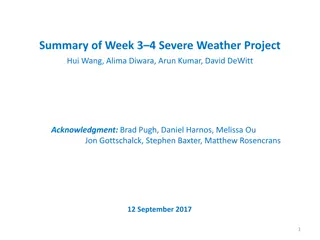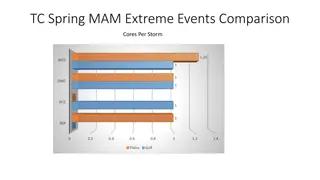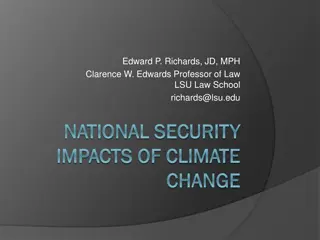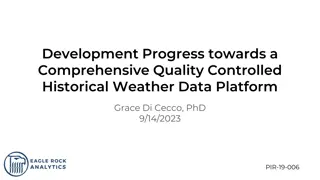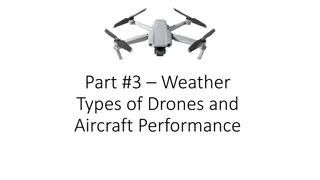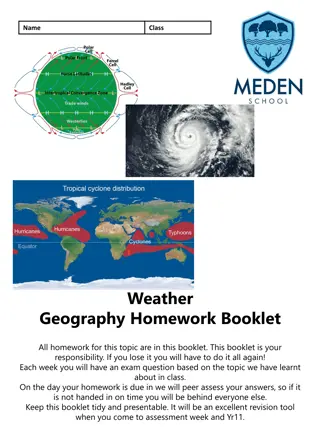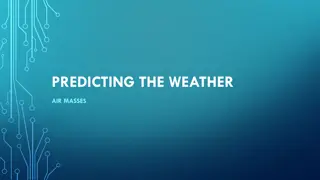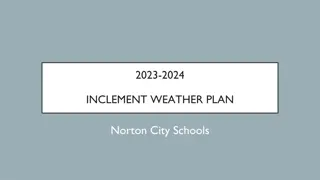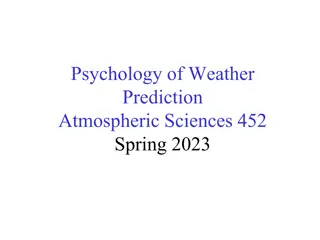Weather Map Interpretation
Weather maps provide data on various weather elements at a specific time. They show isobars, wind direction, cloud cover, rainfall, and more. Weather maps differ from synoptic charts which provide additional detailed information. Analyzing weather maps helps predict weather trends.
6 views • 7 slides
Understanding Extreme Value Theory in Civil Engineering
Introduction to Extreme Value Theory by Gregory S. Karlovits and Emil Julius Gumbel. Exploring the importance of extreme values in civil engineering, Gumbel's EV questions, seeking models for extreme behavior, and lecture outlines on order statistics and extreme value theorems. The discussion includ
1 views • 48 slides
Weather Monitoring Systems Market 2
The increased need for continuous weather monitoring to enable disaster management and the rapid weather fluctuations and climate changes drive the growth of this market. In addition, the increasing adoption of sensors for weather monitoring and the emergence of advanced technologies are expected to
8 views • 2 slides
Understanding Air Masses, Fronts, and Severe Weather in Earth Science
In Chapter 20 of Earth Science, we delve into the dynamics of air masses, fronts, and severe weather. Meteorologists study the movement and characteristics of air masses to predict weather changes. Air masses, defined by their temperature and humidity, interact at fronts, leading to precipitation an
0 views • 7 slides
Exploring Weather through Infrared Temperature Detection
Studying everyday weather using infrared temperature detection from the environment can help in understanding the relationship between temperature variations of different objects and weather conditions. This activity involves creating hypotheses and testing them using an infrared temperature sensor.
0 views • 20 slides
Raising Risk Awareness: Understanding Extreme Weather Events
Raising Risk Awareness initiative focuses on attributing extreme weather events to climate change in Ethiopia, Kenya, India, and Bangladesh. Scientists and experts collaborate to assess risks, prioritize adaptation solutions, and reduce vulnerability by making informed decisions. By understanding th
0 views • 18 slides
Interactive Learning Activities for Weather Pattern Exploration
Engage students in fun activities like listening and drawing games, exploring weather proverbs, and practicing grammar with weather-related examples. Learn about weather patterns and how to inquire about the weather in English while enhancing language skills.
0 views • 12 slides
Winter Safety Preparedness Tips and Cold Weather Hazards
Learn how to prepare for extreme cold weather conditions to stay safe and prevent potential dangers like frozen pipes, car battery issues, power outages, and more. Discover safety tips, warning signs of hypothermia and frostbite, wind chill effects, and practical steps for home and car winter prepar
0 views • 7 slides
Extreme Heat Preparedness and Impacts: CERT Hazard Annexes
Introduction to CERT Hazard Annexes focusing on extreme heat, discussing heat-related illnesses, impacts of extreme heat, and preparedness measures including insulation, window protection, and attic fans. The content emphasizes the preventable nature of heat-related illnesses and the vulnerabilities
0 views • 26 slides
Weather Alert System and Carline Procedures
Thor Guard Lightning is a lighting alert system that provides visual and auditory signals for different weather conditions. Severe weather such as storms or lightning can trigger alerts, leading to specific actions like taking cover or seeking safety indoors. During inclement weather, students and t
0 views • 4 slides
Unpredictable Arctic Monitoring Framework for Extreme Event Integration
This project focuses on integrating extreme event monitoring into existing biodiversity monitoring efforts in the Arctic. The task involves developing a monitoring framework, identifying types of extreme events, and monitoring variables aligned with biodiversity plans. The review paper discusses the
0 views • 15 slides
Exploring Weather Phenomena and Meteorological Predictions
Dive into the fascinating world of weather phenomena and the science behind meteorological predictions in this unit of Living By Chemistry SECOND EDITION. Learn about proportional relationships, temperature scales, behavior of gases, and how to interpret weather maps to make accurate predictions. En
0 views • 19 slides
Cold Weather Pit Count Coordinator Module 3 Planning for Success
Cold weather presents challenges for conducting pit counts to address homelessness. Visibility of homelessness decreases in cold weather, making locating individuals more challenging. Planning ahead with contingency dates, volunteer coordination, and route planning is crucial for success in cold wea
0 views • 11 slides
Mainstreaming Weather and Climate in Radio Discussions
Weather and climate significantly influence various aspects of our lives, from our daily activities to business operations and food supply. This content discusses the importance of incorporating weather and climate discussions in radio broadcasts, emphasizing their impact on health, agriculture, bus
1 views • 19 slides
Evidence of Increasingly Extreme Weather Events in the UK
The UK has been witnessing a rise in extreme weather events such as floods, heatwaves, storms, and heavy rainfall. These events have severe impacts on homes, lives, agriculture, health, and transport systems. The evidence suggests a shift towards more frequent and intense weather occurrences, prompt
0 views • 11 slides
Understanding Weather Fronts: How They Form and Impact Weather Patterns
Weather fronts, including cold fronts, warm fronts, stationary fronts, and occluded fronts, play a crucial role in influencing weather patterns. Cold fronts bring quick storms with heavy rain and thunder, while warm fronts lead to gentle rain followed by milder weather. Stationary fronts result in p
0 views • 17 slides
Understanding Weather: Describing and Observing Weather Patterns
Exploring the fundamentals of weather observation and description, this lesson highlights the importance of using our senses to assess weather conditions such as temperature, wind, and precipitation. Students are encouraged to actively engage with their environment to describe the weather accurately
0 views • 10 slides
Analysing Different Perspectives on Extreme Weather Events
This content provides a structured approach to analyzing and comparing two sources on extreme weather events. It includes questions, paragraph formats, language analysis, and techniques for comparing writer's ideas and perspectives. The focus is on identifying, interpreting, and synthesizing informa
0 views • 23 slides
Weather Derivatives and Risk Management in Utilities
Explore the impact of weather on businesses, specifically utilities, and how weather insurance products can help mitigate risks. Learn about Pacific Northwest Electric's challenges in the face of changing weather patterns and the use of weather protection products. Discover the utility lingo, possib
0 views • 9 slides
Comparison of Extreme Weather Events in Different Seasons
An analysis of extreme weather events across spring, summer, and autumn, focusing on core aspects per storm, average pixels per storm, and stratiform versus convective distribution. The comparison provides insights into variations in weather patterns and intensity across the seasons.
0 views • 30 slides
Understanding Air Masses and Fronts in Weather Systems
Air masses play a crucial role in weather patterns, characterized by temperature and moisture content. They form over specific regions and influence weather conditions when they interact at fronts. Fronts are boundaries between air masses, such as cold fronts, warm fronts, occluded fronts, and stati
0 views • 17 slides
The Incidence of Head and Neck Injuries in Extreme Sports
Study on the prevalence of head and neck injuries in extreme sports, specifically focusing on concussions, a common type of brain injury. The research highlights the impact and risks associated with extreme sports activities, showcasing data on traumatic brain injuries and non-fatal incidents relate
0 views • 25 slides
Understanding Weather and Climate: A Comprehensive Overview
Explore the intricate relationship between weather and climate, uncovering why seasons change, the differences between weather and climate, and how extreme weather events like hurricanes, tornadoes, blizzards, droughts, and floods impact human lives. Delve into the dynamics of Earth's physical geogr
0 views • 16 slides
RAIN - Risk Analysis of Infrastructure Networks in Response to Extreme Weather
Project RAIN aims to address the impact of extreme weather events on critical infrastructure by developing risk management frameworks and mitigation tools. The project focuses on analyzing vulnerabilities, securing networks, implementing control systems, and designing criteria for building secure in
0 views • 10 slides
RAIN Project: Risk Analysis of Infrastructure Networks in Response to Extreme Weather
The RAIN Project focuses on assessing and mitigating the impact of extreme weather events on critical infrastructure across the EU. Through a systematic risk management framework, the project aims to enhance infrastructure security and minimize vulnerabilities. With a vision to develop a more resili
0 views • 25 slides
Understanding the National Weather Service Valid Time Event Code (VTEC)
Explore the evolution of the National Weather Service Valid Time Event Code (VTEC) system introduced in 2005 by Daryl Herzmann at Iowa State University. Learn about the importance of VTEC in weather alerts and how it revolutionized the dissemination of critical weather information. Dive into example
0 views • 10 slides
Evolution in Identifying High-Impact Weather Events since February 1979
Evolution in identifying high-impact weather events since 18-19 February 1979 discusses the advancements in identifying significant weather events. The article highlights the influence of standardized anomalies in recognizing features associated with extreme weather, aiding in the accurate identific
0 views • 22 slides
Understanding Weather Patterns for Predictions
Explore how weather patterns in different locations influence predictions as you review weather data for Detroit and Pomona in January. Learn to make claims about where and when a story takes place using evidence from weather calendars and graphs. Enhance your understanding of weather observation an
0 views • 17 slides
Severe Weather Project Summary for Week 34
Week 34 of the Severe Weather Project focused on expanding development and evaluation of severe weather potential model guidance. The project aimed to develop experimental forecast tools for severe weather at Week 3-4 time range, utilizing a hybrid model and SCP (Supercell Composite Parameter). The
0 views • 21 slides
Extreme Weather Events Comparison in Different Seasons
This dataset contains detailed comparisons of extreme weather events in Spring, Summer, and Autumn for different types of convective cores and stratiform regions. The data includes information on average pixels per storm, cores per storm, and stratiform versus convective ratios across the Plains and
0 views • 30 slides
Understanding Weather Station Data and Atmospheric Pressure Basics
Explore essential concepts in meteorology including weather station instrumentation, atmospheric pressure determination, weather map basics, and isotherm plotting. Learn about interpreting weather station models, identifying pressure systems, and understanding isotherms for temperature analysis on w
0 views • 5 slides
National Security Impacts of Climate Change - Insights by Edward P. Richards
Edward P. Richards, JD, MPH, Clarence W. Edwards Professor of Law at LSU Law School, discusses the national security threats posed by climate change, including destabilization of political regimes, extreme weather events, and health impacts. The presentation covers key issues such as the future para
0 views • 20 slides
Progress Towards a Quality-Controlled Historical Weather Data Platform
Comprehensive development progress towards a quality-controlled historical weather data platform led by Dr. Grace Di Cecco, focusing on the challenges of accessing and aggregating weather observations from various sources and the project's goals of cleaning, aggregating, and standardizing hourly wea
0 views • 21 slides
Understanding Weather Impact on Drones and Aircraft Performance
Delve into the influence of weather conditions on drones and aircraft operations. Explore different types of drones, sensors, and aircraft performance in various weather scenarios. Discover how wind, visibility, and FAA tests affect flight safety. Learn about sources of weather information like META
1 views • 23 slides
Geography Homework Booklet - Weather and Climate Study
A comprehensive geography homework booklet focused on understanding weather and climate topics, covering concepts such as the key differences between weather and climate, forecasting weather conditions, reasons for tropical storms losing energy, and the UK's experience with extreme weather events. S
0 views • 6 slides
Understanding Air Masses in Weather Prediction
Air masses play a crucial role in weather patterns. They are large bodies of air with consistent temperature and humidity characteristics. Different types of air masses, such as Continental Polar and Maritime Tropical, influence weather conditions based on their properties. Weather fronts form where
0 views • 9 slides
Norton City Schools Inclement Weather Plan 2023-2024
The Norton City Schools' Inclement Weather Plan for 2023-2024 outlines procedures for decision-making during severe weather conditions, including the use of altered schedules, remote learning days, and early dismissals. The plan includes detailed steps for monitoring road conditions, checking weathe
0 views • 18 slides
Understanding the Psychology of Weather Prediction in Atmospheric Sciences
Delve into the intricate psychology behind weather prediction in Atmospheric Sciences 452 during Spring 2023. Discover how meteorologists' biases and psychological tendencies impact forecast accuracy, leading to overcompensation, love for extreme weather events, and attachment to conceptual models.
0 views • 18 slides
School Weather Alert System Procedures
A detailed overview of the school's weather alert system including Thor Guard lightning alerts and procedures for inclement weather conditions. It covers the different states of detection, horn signals, and actions to be taken during severe weather. The protocol for handling inclement weather, excep
0 views • 4 slides
Enhancing Maritime Resilience to Extreme Weather Risks
Progress in the Blue-Action project focuses on developing climate services for maritime activities, improving risk awareness, and enhancing stakeholder capacity to adapt to climate change impacts in the Arctic region. The project aims to address gaps in understanding severe weather events and their
0 views • 6 slides


